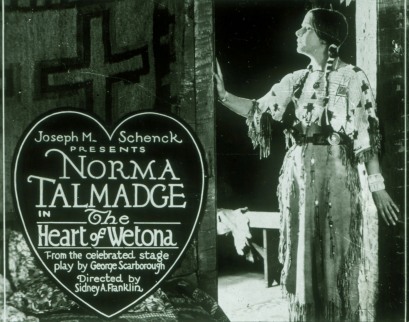
Here’s a curious one: Wetona. The name started appearing in the U.S. baby name data during the second half of the 1910s:
- 1922: 10 baby girls named Wetona
- 1921: 6 baby girls named Wetona
- 1920: 12 baby girls named Wetona [peak]
- 1919: 9 baby girls named Wetona
- 1918: unlisted
- 1917: unlisted
- 1916: 5 baby girls named Wetona [debut]
- 1915: unlisted
The SSA data from that far back isn’t terribly reliable, though, so here’s data from the Social Security Death Index (SSDI) for the same time period:
- 1922: 6 Wetonas
- 1921: 4 Wetonas
- 1920: 9 Wetonas and 1 Wetonah
- 1919: 10 Wetonas, 1 Wetonah, and 1 person with the middle name Wetona
- 1918: 1 Wetona
- 1917: 1 Wetona
- 1916: 1 Wetona and 1 Wetonah
- 1915: none
What put Wetona (and Wetonah) on the map in 1916? The play The Heart of Wetona, which was written by George Scarborough and performed on Broadway from February to May, 1916. It starred actress Lenore Ulric as the “Indian princess” Wetona.
How did Scarborough come up with the name Wetona? I’m not sure that he did. “The play was originally called Oklahoma and focused on problems of religious leaders in the new state.” It was then rewritten by theatrical producer/playwright David Belasco, who “changed some of the characters to Indians and the locale to a reservation.”
A few years later, in 1919, two things happened. First, the play was turned into a silent film starring Norma Talmadge. Second, the song “Heart of Wetona” — which was “inspired by and dedicated to Norma Talmadge” — was published. These two things together account for the increased usage of the name Wetona that year.
Do you like the name Wetona? Do you think it’s usable nowadays?
Sources:
- Pisani, Michael V. Imagining Native America in Music. New Haven: Yale University Press, 2005.
- The Heart of Wetona – IBDB

I guess because it sounds a bit like Wheatena, when I hear Wetona I think ‘breakfast cereal’ not ‘Indian Princess’.
I can see how a strong breakfast cereal association might be a drawback. :)